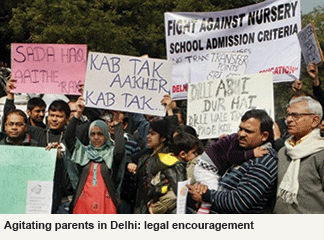 CHAOS OVER NURSERY admissions in Delhi is becoming more confounded with parents resorting to fraud and trickery to get children admitted into the nurseries of the city’s estimated 6,600 composite schools, which ensures a smooth passage in school education for the next 12 years.
CHAOS OVER NURSERY admissions in Delhi is becoming more confounded with parents resorting to fraud and trickery to get children admitted into the nurseries of the city’s estimated 6,600 composite schools, which ensures a smooth passage in school education for the next 12 years.
After an investigation by the state government’s education ministry unearthed that, “out of 1,520 applications in which (points for) inter-state transfer had been claimed, 844 applications were not genuine,” on February 27 the Delhi high court passed an order scrapping the five points weighting given to the inter-state transfer category. Under the 100-point guideline issued by Delhi’s lieutenant governor, children who live in the neighbourhood (within 8 km) are awarded 70 points, 20 more points if they have a sibling already studying in the school of choice, and five points if a parent is an alum of the school. But given the huge number of applications with identical points surpassing the small number of available nursery seats, each school is obliged to conduct a draw of lots (aka lottery) to finalise admission eligibility. Yet following the abolition of the inter-state transfer criterion, on March 6 the Delhi high court ordered fresh draw of lots.
Unsurprisingly these court orders didn’t go down well with parents who have already run the gauntlet and whose children have been admitted under the first draw of lots. Therefore they appealed the March 6 order mandating another lottery. Responding to the appeal, on March 12, a division bench of acting Chief Justice B.D. Ahmed and Justice Siddharth Mridul stayed the March 6 order postponing hearing to April 2.
The genesis of problems concerning nursery admissions can be traced to a Delhi high court division bench order dated September 4, 2006 in Rakesh Goel vs. Montford School (LPA 196/2004), constituting an expert committee headed by Ashok Ganguly (then chairman of CBSE) to evolve a transparent system to govern nursery admissions and eliminate child interviews. In 2007, the Ganguly committee presented an admissions process based on a formula giving graded weighting to neighbourhood, alumni, sibling, single parent, inter-state transfer and management quota children.
Despite this, nursery admissions have become a battleground for disputes between the Delhi state government and private unaided schools with parents rushing to court for alleged infractions of the Ganguly committee’s admission criteria, as also for allegedly charging exorbitant tuition fees. Curiously, the Delhi high court has repeatedly admitted such writs despite the apex court judgement in T.M.A. Pai Foundation Case (2002 8 SCC 481) clearly stating that “in the case of unaided private schools, maximum autonomy has to be with the management with regard to administration, including the rights of appointment, disciplinary powers, admission of students and the fees to be charged”.
“Nowhere else in the country is the state government micro-managing admissions into private unaided schools. The T.M.A. Pai judgement clearly states that admissions into private schools can’t be regulated by government. Instead of appreciating the role they play in providing quality education to students, the Delhi state government is trying to regulate private schools and push them out of business,” says Kamal Gupta, counsel of the Action Committee for Unaided Recognised Private Schools.
Adds Dr. Shyama Chona, the highly-respected former principal of Delhi’s top-ranked DPS, R.K. Puram: “Interference with admissions, fees and over-regulation will widen the demand-supply gap in pre-primary education because it discourages current and future promoters from offering nursery education.”
This year, ten writ petitions have been filed in the Delhi high court challenging the nursery guidelines or infractions thereof. Unless the court, which is attaining notoriety for its anti-private school bias, stops admitting them liberally, the annual chaos and clamour for admission into the nurseries of the national capital’s much-too-few private composite schools, is certain to go from bad to worse.
Garima Upadhyay (Delhi)
Medical education dampener
THE FIRST-EVER status report on medical, nursing and public health education released in Delhi on March 12 by the Asia-Pacific Network on Health Professional Education Reforms (ANHER), says India’s medical education is out of sync with the healthcare needs of the country because competency-based learning is not sufficiently practiced in medical schools, and most of them don’t use modern technology-based pedagogies.
The country’s 381 medical colleges (including 206 in the private sector) produce 49,668 graduates every year, the highest number worldwide. But India doesn’t have enough doctors and health workers especially in rural areas. Nor does it have a national strategy for public health professional education, adds the report.
These conclusions are based on a survey of 35 medical and 60 nursing colleges, 23 public health institutions, 1,500 final year MBBS students, 1,500 final year nursing students, 125 public health students in their final year and an equal number of alumni from all three streams across India. The situation analysis for this report has been conducted at three levels — national level assessment using literature and websites reviews, institutional assessment through interviews, and graduate including alumni surveys also by way of interviews.
ANHER, which assesses the status of medical and paramedical education in China, India, Bangladesh, Thailand and Vietnam, was initiated during a five-nation consultative meeting in Hanoi, Vietnam in April 2011. Its brief is to conduct surveys of member countries on health education and promote information sharing and learning in professional health education. The India-specific survey was conducted by the Delhi-based Public Health Foundation of India (PHFI) in partnership with National Board of Examinations (NBE).
According to Dr. M.C. Misra, director of the Delhi-based All India Institute of Medical Sciences (AIIMS), which is routinely ranked among India’s top medical colleges in all media surveys, the major infirmity of medical and paramedical education in India is the huge mismatch between the intake of students into medical colleges and facilities available for developing competency-based skills and hands-on training. “When the number of operating theatres and diagnostic and other facilities is static, increasing the number of medical graduates won’t improve the quality of healthcare available to the public,” says Misra.
This valuable report concludes with six recommendations to reform medical and paramedical education in India, viz, councils for medical and nursing education should proactively engage in advancing the reforms agenda; constitution of an expert group to advance the agenda of competency-driven health professionals; development of curriculum content to balance local needs with global outlook; encourage systems-based learning with greater participation of teaching faculty; encourage partnerships between medical education institutes in the interests of inter-professional education; investment in strengthening infrastructure and curriculum review systems; creation of conducive work environments in rural and remote areas, to “encourage altruism” and permit professional participation.
Curiously while it suggests wide-ranging reforms in medical and paramedical education, the authors of the India status report are shy about mentioning money and budgets. None of the recommendations is implementable in a country which allocates 1.4 percent of GDP for public health and 3.5 percent for education as against the 9-10 percent routinely expended under these heads in developed industrial countries.
Autar Nehru (Delhi)



























